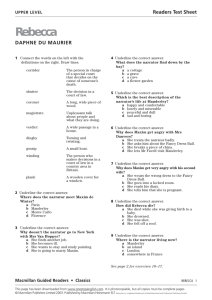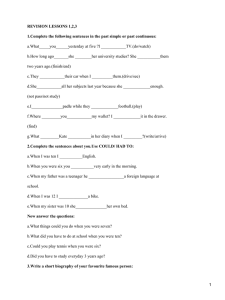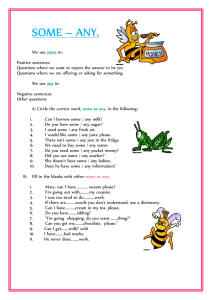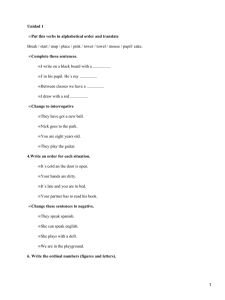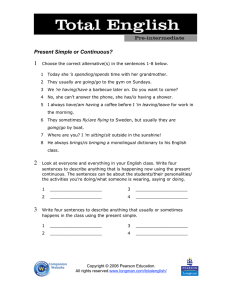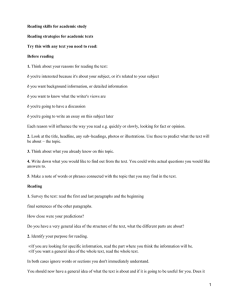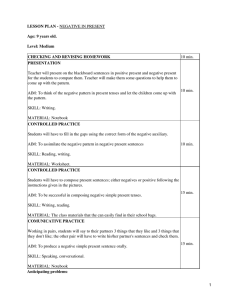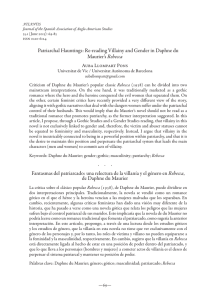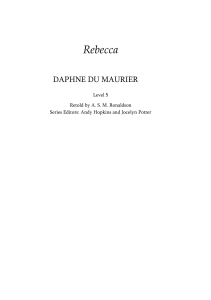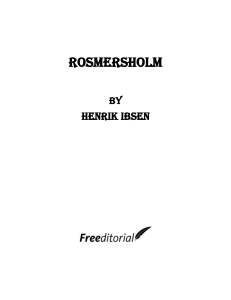1 She saw furniture moving
Anuncio
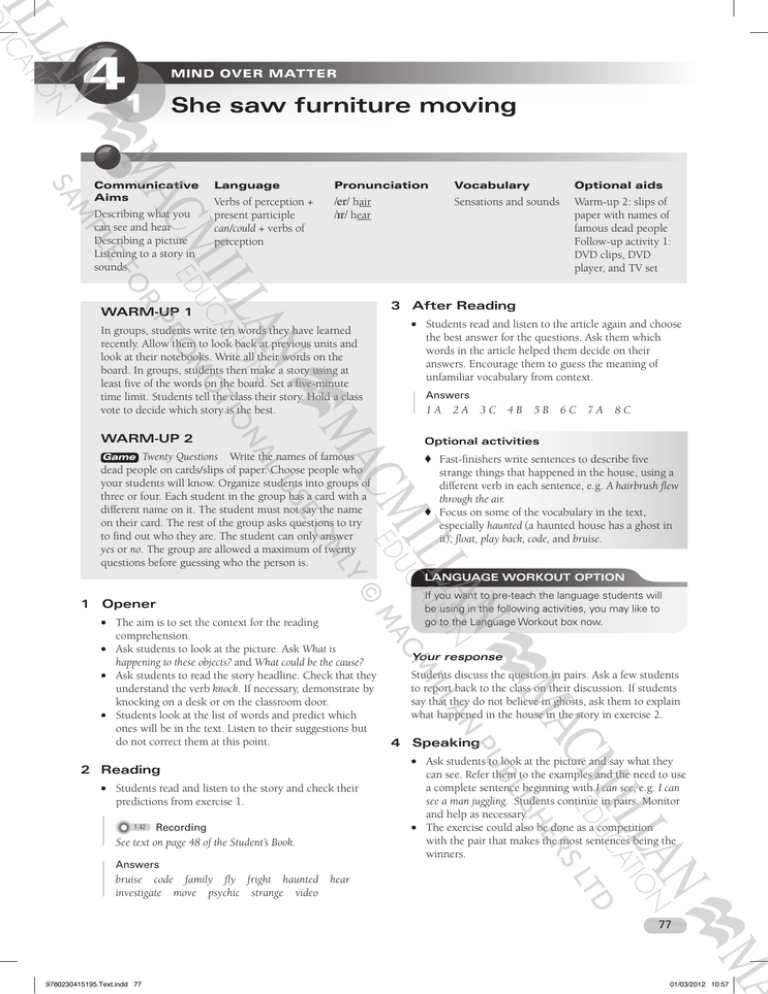
41 MIND OVER MATTER She saw furniture moving 4 Communicative Aims Describing what you can see and hear Describing a picture Listening to a story in sounds Language Pronunciation Vocabulary Optional aids Verbs of perception + present participle can/could + verbs of perception /er/ hair /ɪr/ hear Sensations and sounds Warm-up 2: slips of paper with names of famous dead people Follow-up activity 1: DVD clips, DVD player, and TV set 3 After Reading WARM-UP 1 In groups, students write ten words they have learned recently. Allow them to look back at previous units and look at their notebooks. Write all their words on the board. In groups, students then make a story using at least five of the words on the board. Set a five-minute time limit. Students tell the class their story. Hold a class vote to decide which story is the best. • Students read and listen to the article again and choose the best answer for the questions. Ask them which words in the article helped them decide on their answers. Encourage them to guess the meaning of unfamiliar vocabulary from context. Answers 1A 2A 3C 4B 5B 6C 7A 8C WARM-UP 2 Optional activities Game Twenty Questions Write the names of famous dead people on cards/slips of paper. Choose people who your students will know. Organize students into groups of three or four. Each student in the group has a card with a different name on it. The student must not say the name on their card. The rest of the group asks questions to try to find out who they are. The student can only answer yes or no. The group are allowed a maximum of twenty questions before guessing who the person is. ♦ Fast-finishers write sentences to describe five strange things that happened in the house, using a different verb in each sentence, e.g. A hairbrush flew through the air. ♦ Focus on some of the vocabulary in the text, especially haunted (a haunted house has a ghost in it), float, play back, code, and bruise. LANGUAGE WORKOUT OPTION 1 Opener • The aim is to set the context for the reading comprehension. • Ask students to look at the picture. Ask What is happening to these objects? and What could be the cause? • Ask students to read the story headline. Check that they understand the verb knock. If necessary, demonstrate by knocking on a desk or on the classroom door. • Students look at the list of words and predict which ones will be in the text. Listen to their suggestions but do not correct them at this point. 2 Reading • Students read and listen to the story and check their predictions from exercise 1. 1.42 Recording See text on page 48 of the Student’s Book. Answers bruise code family fly fright haunted investigate move psychic strange video If you want to pre-teach the language students will be using in the following activities, you may like to go to the Language Workout box now. Your response Students discuss the question in pairs. Ask a few students to report back to the class on their discussion. If students say that they do not believe in ghosts, ask them to explain what happened in the house in the story in exercise 2. 4 Speaking • Ask students to look at the picture and say what they can see. Refer them to the examples and the need to use a complete sentence beginning with I can see, e.g. I can see a man juggling. Students continue in pairs. Monitor and help as necessary. • The exercise could also be done as a competition with the pair that makes the most sentences being the winners. hear 77 9780230415195.Text.indd 77 01/03/2012 10:57 4 UNIT Suggested answers Answers I can see … a boy skateboarding a man singing a group playing instruments some boys playing soccer some children swimming a girl flying a kite a man walking a dog some people having a picnic some people reading some women talking a man fishing a woman riding a bicycle A I can hear people running. B I can hear a car starting. C I can hear a car stopping. D I can hear a door opening. E I can hear a door closing. f I can hear people running again. G I can hear a door opening. H I can hear music playing. I I can hear bells ringing. J I can hear people clapping and cheering. K I can hear a car driving off. Optional activities ♦ With a less confident group, allow students time to look up/ask about the vocabulary they will need. ♦ Fast-finishers look out the window of the classroom (or imagine they are looking out of a window in the school) and say what they can see and hear. ♦ Students work in pairs. One student closes his/her book and tells the other student as many things as possible that he/she saw in the picture. Then students exchange roles and repeat the activity. 5 Listening • Tell students the words in the box all describe sounds. Ask students to look at the words and encourage them to ask each other What does … mean? if any of the words are unfamiliar. Be prepared to demonstrate/ provide a situation for cheer and clap. • Tell students they are going to hear one of the sounds. Students listen and tell their partner what they can hear. Do the first one together as an example. Play the recording and pause after each sound for students to answer. Monitor and re-play any sounds that the students have difficulty identifying. • Elicit what is happening in the sequence of sounds. If students have problems guessing the context, tell them it’s a wedding (in a church). 1.43 Recording Students hear the following sounds: Man and woman running and getting into car. Car starting and driving off fast. Tires screaming as car stops. Car doors open and are slammed shut. Male and female feet running along gravel path and up steps. Big heavy creaking wooden door opening. Organ music—“Here comes the bride.” Church bells ringing. People clapping and cheering. Car driving off amid “Byes.” Optional activity With less confident students, students write their answers first. Extension Students work in pairs and write a paragraph about what happened. Less confident students can write the sequence of sounds, e.g. First we heard people running. Then we heard a car starting. More confident students can interpret the whole situation and add reasons, e.g. First we heard people running because they were late for a wedding. 6 Pronunciation • Write the words hair and hear on the board. Elicit the pronunciation of the words, and then ask students to take off the /h/ and pronounce the two sounds. Demonstrate the two sounds, showing students that the mouth is more open and rounded for the /er/ sound and more stretched for the /ɪr/ sound. • Ask students to look at the words in the chart. Play the first part of the recording, pausing after each word for students to repeat. 1.44 Recording /er/ hair air chair /ɪr/ hear ear cheer dare pair wear dear pier we’re • Play the second part of the recording. Students listen and write the words they hear. Ask students to compare answers. If necessary, play the recording again. Ask different students to say and spell the answers. 1.44 hear Recording and answers air chair dear pair we’re Optional activity If these are difficult sounds for your students, ask them to write five of the words from the chart in their notebook. They then dictate them to their partner and compare to see if the communication was successful. Monitor and help as necessary. 78 9780230415195.Text.indd 78 01/03/2012 10:57 UNIT 7 Writing • Ask students to close their eyes. Tell them to imagine it’s Saturday morning and they are still in bed. Tell them to think about what they can hear and smell. Give them a minute to create the scene in their heads. • Ask students to open their eyes and write five sentences using I could hear/smell … Set a five-minute time limit. Students compare their sentences and find out if there are any that are the same. Optional activity Give students more options, e.g. It’s Saturday or Monday morning/it’s now or they are living in the future or in the past/they are themselves or they are rich and famous. When students tell each other their sentences, their partner guesses the situation. LANGUAGE WORKOUT • Ask students to complete the Language Workout box. Confident students can complete first and then check, while others can look back at exercise 2 and then complete. • Students turn to page 116 of the Language File to check their answers. Answers (mov)ing (fly)ing hear see • Highlight that: – the verb of perception is followed by an object: see/hear + someone + -ing – there are other verbs that can be used in this way, e.g. watch, notice, listen to, smell, feel. • Drill the examples in chorus for pronunciation, paying particular attention to the pronunciation of can /kən/ and could /kʊd/. 4 Practice • Ask students to look at Practice exercise 11 of the Language File on page 116 and complete the sentences with the present participle of the verbs. Do the first one together as an example. • Check the answers by asking different students to say the completed sentences. Answers 1 singing 2 walking 3 dancing 6 leaving 7 touching 8 sitting 4 playing 5 cooking Follow-up activities ♦ Play a DVD clip. Allow students to listen to the sound, but turn the television off so they cannot see the screen. Students tell each other what they heard. They then predict what is happening. Play the clip again and students watch the scene to check their predictions. Finally, they tell their partner what they saw. ♦ Game Am I pretending? Student 1 thinks of a place. They do not say which place it is. They describe one thing they can hear/see/smell. Student 2 privately guesses the place and adds another thing they can hear/see/smell there. Student 3 continues and so on. A student must stop playing if they cannot continue the chain or they are challenged to name the place where all these things can be seen/heard/smelled and are unable to do so. If they are challenged and they can name a place where all these things are heard/seen/smelled, then the challenger must stop playing. Homework Ask students to imagine that they meet their favorite person who is no longer alive. Students write a description of the meeting using I heard/saw him/her … Optional activities NOTEBOOK SECTION ♦ Students make sentences with the other verbs that follow the same pattern, e.g. I watched him walking down the street. ♦ With confident students, point out that the infinitive can be used instead of the present participle, e.g. They heard him sing. Highlight that the present participle is used when you are interested in the activity that is happening. The infinitive is used when you are interested in the complete, finished event. Complete the sentences with one of these words: ring, make, run, bite, wash. 1 I always see you ______ in the park. 2 Couldn’t you feel the mosquitoes ______ you? 3 I heard the phone ______ but I couldn’t get it. 4 Did you notice them ______ a movie? 5 We watched him ______ the dog. Answers 1 running 2 biting 3 ringing 4 making 5 washing WEBLINK Students may like to visit www.the-atlantic-paranormal-society.com. This is a society that investigates hauntings like the one experienced by the Hodgson family. Consolidation and Extension p57 Workbook Unit 4 Lesson 1 pp38–39 Language File p116 Photocopiable worksheet p173, notes p159 79 9780230415195.Text.indd 79 01/03/2012 10:57 4 MIND OVER MATTER 2 I’ll keep my fingers crossed! Communicative Aims Making predictions, promises, and offers Talking about plans and intentions Language Pronunciation Vocabulary Optional aids Future review: will/ won’t, shall, and going to /æ/ bad /ʌ/ luck Superstitions Phrasal verbs with out Exercise 7 optional activity: small cards for Vocabulary box WARM-UP 1 If students wrote about meeting famous people who are no longer alive for homework, ask them to tell each other their stories in groups. WARM-UP 2 Re-tell the story of the haunting at the house on page 48, but make some factual mistakes, e.g. A toothbrush flew through the air hitting Janet’s sister on the arm. Students listen and shout Stop! when they hear a mistake. They correct the mistake. WARM-UP 3 Students see how many words they can make from superstition. Students may not use a letter more than once unless it appears more than once in the word itself. The student with the greatest number of words wins. 1 Opener • The aim is to set the scene and pre-teach the vocabulary for the reading. • Books closed, give one example of a superstition, e.g. seeing a black cat, the number 13, and ask students if it brings good luck or bad luck. • Ask students to work in pairs and discuss which of the superstitions in the U.S. bring good luck and which bring bad luck. Check their answers as a class. • Ask Do we have the same superstitions? Are there any different ones here? Are there any we have which are not here? Answers Good luck: catching a falling leaf in the fall, crossing your fingers, throwing a coin into a fountain Bad luck: breaking a mirror, opening an umbrella indoors, walking under a ladder 2 Reading • Students look at the pictures with the magazine article. Pre-teach and review vocabulary by asking Which superstition does the first picture represent? Which superstition does the second picture represent? What time of day is it in the third picture? • Students look at the title and sub-title. Ask What’s another word for down to earth? (practical, realistic). Give students five minutes to complete the questionnaire. Be prepared to explain knock on wood (people say this and often try to knock on something made of wood when they hope something good will happen or something bad won’t happen) and lucky charm. • You could ask students to listen to the questionnaire and check their answers. 1.45 Recording See text on page 50 of the Student’s Book. 3 After Reading • Students turn to page 121, figure out their score, and read the paragraph that relates to them. • Students compare their scores with each other. Find out if they agree with the description of themselves. • Point out that in some regions, a red sky in the evening means that clouds have passed by and weather is clear to the west. This can often mean that the next day will not be rainy. Your response Students work in pairs and discuss the first question. Ask each pair to report back to the whole class. Have a show of hands to find out how many students in the class are superstitious and count the number of boys and the number of girls in the class who say they are superstitious. Extension Students work individually and make a list of superstitions they have in their country. Then ask them to work in small groups of 3–4 and compare their lists. Ask each group to report back to the whole class and make a list of superstitions in note form on the board, e.g. broken mirror, black cat, ladder. LANGUAGE WORKOUT OPTION If you want to pre-teach the language students will be using in the following activities, you may like to go to the Language Workout box now. 80 9780230415195.Text.indd 80 01/03/2012 10:57 UNIT 4 Listening • Students tell their partner what they can see in the picture. Read the first part of the story and the question aloud. Encourage students to say I think he’ll … Accept all suggestions. • Play the recording. Pause at the end of the next part of the story. Did anyone guess correctly? Play this part of the story again, including the question. Students answer the question in pairs. Ask one or two students to tell the class their ideas. Repeat the procedure until the end of the story. 1.46 Extension Ask students if they think it is a true story and why/why not. 5 Speaking • In pairs, one student reads the statement and their partner responds. Do one with the whole class. Answers I won’t forget anything. I’ll drive carefully. I’ll look at the map. I’ll call once a week. I won’t be away for long. • Ask students to look at the Language File on page 116. Highlight the use of Shall I + infinitive to make an offer. Highlight that shall is only used in questions, not statements. Drill the example sentence. 9780230415195.Text.indd 81 • In pairs, one student reads the statement and their partner responds. Do one with the whole class. Answers 6 7 8 9 10 Shall I turn off the lights?/I’ll turn off the lights. Shall I lend you one?/I’ll lend you one. Shall I close the window?/I’ll close the window. Shall I turn down the heat?/I’ll turn down the heat. Shall I carry it for you?/I’ll carry it for you. Optional activity Less confident students write the responses first. Recording A doctor is driving home along a quiet country road. It’s late at night and it’s raining hard. Suddenly he sees a girl walking along the road. She looks like a student. What do you think the doctor will do? The doctor stops the car and asks “Are you all right? Where are you going?” The girl replies, “I’m walking home—I missed the last bus.” What do you think the doctor will say? “Shall I give you a ride?” offers the doctor. “Oh, yes please,” says the girl and she gets into the back of the car. “I live about five kilometers along the road—it isn’t far.” The man starts the car and asks for the girl’s address. But at that moment, a truck comes very fast toward them. “Look out!” screams the girl. What do you think will happen next? The doctor manages to avoid the truck. “Gee, that was lucky!” he says. The girl doesn’t answer, so he turns around. There’s no one in the back of the car! But then he sees the girl’s bag lying on the seat. What do you think he will do next? The doctor stops the car, picks up the bag, and opens it. He finds a wallet with the girl’s address in it. What do you think the doctor will do now? The doctor drives to the girl’s house and rings the doorbell. Finally, a woman with gray hair opens the door. “Good evening,” says the doctor. “I’m sorry to trouble you, but a girl left this bag in my car … ” What do you think the woman will say? “Thank you,” says the woman. “The bag is my daughter’s. But she died in a car accident exactly a year ago.” 1 2 3 4 5 4 6 Pronunciation • Play the recording, pausing after each word for students to repeat. Note that the mouth is more open and the lips more spread for /æ/ and more closed with the lips more rounded for /ʌ/. • In pairs, students practice saying the words. 1.47 Recording /æ/ bad cat cap match ran sang /ʌ/ luck cut cup much run sung • Play the second part of the recording. Students listen and write which of the words they hear each time. • Check by asking individual students to read aloud the words they have written. Write exactly what you hear on the board. For example, if a student says cat when the correct answer is cut, write cat and ask the student to pronounce cut correctly. 1.47 cut Recording and answers cup match run sang 7 Vocabulary • In pairs, students match the phrasal verbs and definitions. Check the answers with the whole class. • Ask students to find two examples of phrasal verbs with out in the questionnaire on page 50. Students can use the context to figure out the correct definitions for these. Answers 1 look out 2 figure out 3 find out 6 take out In this lesson: find out and go out. 4 go out 5 try out Extension Students work individually to complete the sentences with verbs from the Word Bank. Then have them check their answers in pairs. (1 go out 2 find out 3 figure out 4 try out 5 Look out) Optional activity If you have a Vocabulary box, students copy the phrasal verbs onto cards, putting the definitions and examples on the back, and add them to the box. 81 01/03/2012 10:57 4 UNIT 8 Writing • Ask one student to read the instructions aloud. Brainstorm some possible topic areas with the students, e.g. school, family, friends, free time, weather. Check which verb form students use to talk about plans, and which verb form is used with think and hope. Set a 10-minute time limit. Monitor and help as necessary. 3 4 5 6 7 8 ’ll (offer) ’ll (decision made at the time of speaking) ’s going to (prediction from present evidence) won’t (prediction) ’ll (prediction) ’ll (promise/decision at moment of speaking) Follow-up activity LANGUAGE WORKOUT • Ask students to complete the Language Workout box. Confident students can complete first and then check, while others can look back at exercise 2 and then complete. • Students turn to page 116 of the Language File to check their answers. Answers won’t (I)’ll (I)’ll (I)’ll (I)’m going you going is going • Highlight that: – both will/won’t and going to can be used for predictions: Will/won’t is usually used when there is no evidence, it is just something you believe; going to is used when there is some present evidence. Check students understand “present evidence” by asking what the present evidence could be in the second example sentence (the speaker has heard the weather forecast). – will/won’t is used for decisions made at the time of speaking and going to is used for plans or intentions. – will is contracted in spoken English, e.g. I’ll. – the pronunciation of to in going to is /tə/. going to is often pronounced or written gonna /ˈgɔnə/. • Drill the examples in chorus and individually. Practice • Ask students to look at Practice exercise 12 of the Language File on page 116 and complete the conversation with the correct form. Do one with the whole class as an example. • Check answers and ask students to say why they chose will/going to. Answers 1 ’m going to (prediction from present evidence) 2 ’m going to (plan/intention) Write the following on the board: Find someone who … Name thinks he/she will … tomorrow/ next week/next month/next year hopes he/she will … tomorrow/ next week/next month/next year is going to … tomorrow/next week/ next month/next year isn’t going to … tomorrow/next week/ next month/next year Students complete the four sentences with ideas and choose one of the time references. They then move around the classroom, asking the appropriate question until they find someone who says yes. They write that student’s name next to the sentence. Homework Tell students they can be any famous person. Students write a paragraph about their future plans, beliefs, and hopes as if they were this person. As in exercise 8, students write about what they know is going to happen and what they think and hope will happen. NOTEBOOK SECTION Circle the correct option in each sentence. 1 OK. I ’ll/’m going to do it. 2 What are you going to/will you do at the mall? 3 Here. I ’m going to/’ll carry that for you. 4 I think I ’ll/’m going to have a sandwich. 5 She ’s going to/’ll have a baby in a few months. Answers: 1 ’ll 2 are you going to 3 ’ll 4 ’ll 5 ’s going to WEBLINK Students may like to visit http://worldsuperstitions.blogspot.com where they can read about superstitions around the world. Consolidation and Extension p57 Workbook Unit 4 Lesson 2 pp40–41 Language File p116 Photocopiable worksheet p174, notes p159 82 9780230415195.Text.indd 82 01/03/2012 10:57 4 MIND OVER MATTER 3 What would you do? Communicative Aims Talking about imaginary or unlikely situations Giving advice Language Pronunciation Vocabulary Optional aids Second conditional Pronunciation of gh Geographical features Weather Illnesses and ailments Survival kit Follow-up activity 1: large pieces of paper and colored pens WARM-UP 1 If the students wrote about the future plans of a famous person, ask them to read their paragraph to their partner, without saying the name of the famous person. Their partner guesses who the famous person is. WARM-UP 2 Introduce the topic of survival by asking students if they have seen any reality TV shows such as Survivor or dramas/movies such as Lost or Castaway. Tell students to imagine they have to live alone on an island for a week. They can take one song, one book/movie, and one luxury item. Students tell their partner what they would take and why. 1 Opener • The aim is to set the context and pre-teach vocabulary for the questionnaire in exercise 2. • Check first that students understand survival by asking What things do we need for survival? (water, food, heat, shelter, etc.) and In what places/situations is survival difficult? (the desert, space, jungle, etc.). • Ask students to look only at the pictures in the questionnaire and guess which of the words from the box they expect to find in the questionnaire. Answers bear, desert, fire, forest, lightning, oasis, river, thunderstorm, wind, waterfall 4 Listening • Play the recording for students to listen to and write down Zak’s answers to the questionnaire. • Check that students have correctly calculated his score. 1.48 SOPHIE ZAK SOPHIE ZAK SOPHIE ZAK SOPHIE ZAK SOPHIE ZAK SOPHIE ZAK SOPHIE ZAK 2 Reading • Students read and answer the questionnaire. Be prepared to translate or explain shelter, crouch, and whistle. • Ask students to compare their answers in groups. 3 After Reading • Students turn to page 121 to find out their scores. Your response Ask students which of the situations they would enjoy and which they would be frightened in. SOPHIE ZAK SOPHIE ZAK SOPHIE ZAK 9780230415195.Text.indd 83 Recording Zak, would you like to answer this questionnaire? What kind of questionnaire is it? It’s a survival questionnaire—about what you’d do to survive in difficult situations. OK, let’s take a look. Question 1: What would you do in the desert if you didn’t have enough water? I don’t know. I think I’d eat a lot because there’s water in food. So that’s A. Right. Here’s question 2: what if you were in an area where there were lots of snakes? I think I’ll go for A. I’d walk as quietly as possible. Next question: What if you were outside in a thunderstorm and lightning was near? You know I hate thunderstorms. Uh, I think I’d take off all metal objects and crouch on the ground. So you’re going for C. Yes. I see. And this is question 4: If you were lost in a forest without a phone, how would you let your friends know where you were? Mm. That’s an interesting one. I’m not much good at shouting or screaming so I’d probably whistle loudly. That’s C. All right—now question 5. What would you do if you were out walking and saw a bear? I have no idea! I think I’d climb the nearest tree. That’s C again. Question 6: If you had to cross a fast river with waist-high water, which way would you face? I think I know this one. I’d face upstream, because that’s where the water is coming from. Answer: A. And now question 7: What would you do if you were in a forest fire? Oh, that’s a tricky one. Uh, I think I’d figure out which way the wind was blowing, and run in the same direction. 83 01/03/2012 10:57 4 UNIT So your answer is B. That’s right. Here’s question 8: If you were on a steep hill covered in large slippery rocks, what would be the safest way to climb it? That’s hard. I think I’m going to go for B: I’d keep my socks and boots on. And here’s question 9: If you were lost in a forest and very hungry, how would you decide which plants were safe to eat? I don’t know a lot about plants, and I don’t like the idea of putting something which could be poisonous in my mouth, so I think I would choose B—I’d look and see what the birds were eating and do the same. And now for the last question: What would you do if you were in a boat on the edge of a waterfall? And you know I’m afraid of heights! Well, I wouldn’t jump, I’d stay in the boat and hold on tight. You’ve chosen C again. OK—now let’s find out your score! SOPHIE ZAK SOPHIE ZAK SOPHIE ZAK SOPHIE ZAK SOPHIE Answers 1A 2A 3C 4C 9 B 10 C Zak’s score: 1 point 5C 6A 7B 8B LANGUAGE WORKOUT OPTION If you want to pre-teach the language students will be using in the following activities, you may like to go to the Language Workout box now. 3 I can’t get to sleep at night. If I were you, I’d do more exercise and go to bed later. You could read a boring book in bed. And you could try counting sheep! 4 I think I’m getting a cold. If I were you, I’d eat lots of oranges. 5 I have a headache. If I were you, I’d take some aspirin and lie down. 6 I have a cough and a sore throat. If I were you, I’d drink hot lemon juice and honey. And I’d stop talking! Answers 1 take a deep breath and count to 100, drink a glass of water 2 take some aspirin, see a dentist 3 do more exercise, go to bed later, read a boring book, count sheep 4 eat lots of oranges 5 take some aspirin, lie down 6 drink hot lemon juice and honey, stop talking Extension In pairs, students give their own advice to problems 1–6, using If I were you, I’d/I wouldn’t … Ask the students to tell the rest of the class if they had any better ideas. 7 Pronunciation • Ask students to look at the words in the box and, in pairs, decide which words contain the sound /f/. • Play the recording. Pause after each word for students to repeat and check their answers. 1.50 5 Speaking • In pairs, students ask and answer questions about the imaginary situations 1–6, using the second conditional. • Ask one or two pairs to ask and answer about one of the situations in front of the class. Other students can say if they had different or similar answers. Extension Students add three more imaginary situations to the list. They then work in pairs and ask their partner what they would do/say/feel in each case. 6 Listening • Ask the students to read problems 1–6 and predict which phrases from the box will be used. Check that students understand cough and hiccups by asking for a demonstration. • Play the recording for students to check their predictions, matching advice with problems 1–6. 1.49 Recording 1 I have the hiccups. If I were you, I’d take a deep breath, and count to one hundred. Or I’d drink a glass of water. 2 I have a toothache. If I were you, I’d take some aspirin and see a dentist. Recording and answers cough enough ghost high laugh lightning night thought through tight weight /f/ cough, enough, and laugh Optional activity Students group together words from the box which have the same pronunciation of gh, e.g. high, tight. 8 Speaking • Ask students to imagine they were going backpacking and had to choose ten items from the box to include in their backpack. • Check first that students understand and can pronounce all the items, by asking questions, e.g. Which do you need for sewing? Which makes something look bigger? Drill any problem words. • In pairs, students discuss what to choose. Remind students to give reasons why items would(n’t) be useful, using the second conditional, as in the examples. • Set a time limit for students to reach joint decisions. • Students work with a different partner to compare what they have decided they would take and why. • Students report back to the whole class using the example sentences as a model. 84 9780230415195.Text.indd 84 01/03/2012 10:57 UNIT 9 Writing • The aim is for students to write some useful advice, using the expression If I were you … and the second conditional where appropriate. Ask students to give reasons for their advice. • Set the context by asking a confident student to read the instruction aloud. Remind students to look back at the vocabulary in exercise 8 for ideas and help. • Ask students to show their paragraphs to their partner to see who wrote the best advice. 4 Answers 1 2 3 4 5 6 7 8 How would you survive if you got lost in the mountains? If my cell phone worked, I’d dial 911. What would you do if the battery was dead? If I had a mirror, I’d try to send signals. Would you feel scared if you were alone? I’d sing rap songs if I felt scared. What if you had to spend the night in the mountains? If I was/were cold, I’d make a fire. Follow-up activities LANGUAGE WORKOUT • Ask students to complete the Language Workout box. Confident students can complete first and then check, while others can look back at exercises 2 and 3 and then complete. • Students turn to page 116 of the Language File to check their answers. Answers would stand were; would(n’t) jump would (you) do; did(n’t) have if; were • Highlight that: – the second conditional is formed with If + simple past, would(n’t) + infinitive. – If I/he/she/it was is often used instead of were in spoken English. – The condition and result clauses can be reversed. – We use the second conditional to talk about imaginary present or unlikely future situations. Its choice in preference to the first conditional suggests the speaker considers the situation hypothetical/less possible. • Drill the examples in chorus for pronunciation and stress. Encourage students to use the ’d contraction . Optional activity Read aloud one half of some of the conditional sentences, either the condition or the result clause, from the questionnaire. Students must shout out a possible second half of the sentence, e.g. I’d run uphill as fast as I could… (Student: if I were in a forest fire). Practice • Students do Practice exercise 13 in the Language File on page 116. ♦ Pairs of students make up a What would you do if …? question, e.g. What would you do if you won the lottery/were President of this country/had only one day to live? Students ask their question to as many different students as possible, noting down the answers of each student. They then display their answers on posters, with illustrations/photos and the question as the title. ♦ Game Guess the question Before the class, prepare a couple of What would you do if … questions and three possible answers to each. Read out only the answers to the students, e.g. I’d be frightened, I’d call 911, I’d run out of the house. Students work in pairs to guess what the question was and write it down, e.g. What would you do if there was a fire in your house? Ask pairs of students to do the same. Homework Students interview someone outside school, e.g. a friend or family member, asking them five What would you do if …? questions. They can use the survival questions from exercise 2 or their own questions. They can do the interview in their own language, but then write it up in English. NOTEBOOK SECTION Complete the sentences, using a form of each word in parentheses. 1 I’d _____ it, if she _____ me to. (do, ask) 2 If they _____ me dancing I would _____! (see, die) 3 We wouldn’t _____ so angry if you _____ us the truth. (be, tell) 4 He’d _____ crazy if he _____ his cell phone. (go, not have) 5 What would you _____ if I _____ to get a job? (think, decide) Answers: 1 do, asked 2 saw, die 3 be, told 4 go, didn’t have 5 think, decided WEBLINK Students can find more advice and trivia on survival in a variety of situations by visiting www.wildsurvival.com Consolidation and Extension p57 Workbook Unit 4 Lesson 3 pp42–43 Language File p116 Photocopiable worksheet p175, notes p160 85 9780230415195.Text.indd 85 01/03/2012 10:57 4 MIND OVER MATTER 4 Integrated Skills Telling a story Skills Listening Reading Rebecca story Speaking Continuing the story based on pictures and prediction outcomes Listening Listening to check predictions Writing Retelling the end of a story Learner independence Guessing the meaning Word creation: noun → adjective, verb → noun WARM-UP 1 Write mixed-up second conditional sentences on the board. Set a time limit for students to re-order them in pairs. WARM-UP 2 Game Shark For instructions see Unit 1, Lesson 3, page 33. Play with the word Rebecca and tell students that it’s a woman’s name. Afterward, students say if they know anyone called Rebecca or the equivalent, if there is one, in their native language. Vocabulary Optional aids Useful expressions Follow-up activity 2: small cards for Vocabulary box Answers 1 2 3 4 5 In Monte Carlo Maxim de Winter’s first wife She drowned in a boating accident. On the southwest coast of England She was shy and young, she was in charge of a huge house with lots of servants, and Rebecca seemed to haunt the house. 6 Unfriendly 7 Because it held bad memories. 8 Rebecca Optional activity Useful information The book Rebecca was first published in 1938 and is Daphne du Maurier’s (1907–1989) most famous novel. It is a haunting thriller in which the name of the main character, the second Mrs. de Winter, is never known. In 1940, the movie, directed by Alfred Hitchcock, won the Oscar for Best Picture. 1 Opener • Ask students to look at the book cover. Ask What kind of story do you think it is going to be? Would you like to read this book? • Ask students to read the short introduction. Check comprehension by asking Who is Rebecca? Does Maxim talk about her? What about other people? Students discuss the problems the new wife might have. 2 Reading • The aim is for students to read to get a general idea of the story without worrying about individual words. • Students read the questions and look in the text to find the answers. They write short answers. Encourage students to guess the meaning of new words from context. Students compare their answers in pairs. Check the answers with the whole class. Fast-finishers prepare further comprehension questions to test their partner, e.g. How old was the second Mrs. de Winter when she first met Maxim? 3 Speaking • Students look at the pictures and read the captions. Check students understand costume ball (a formal party where you wear costumes) and wig. • Ask Who are they? Where are they? What are they talking about? in relation to the first picture. In pairs, students say what is happening in the other three pictures. • Play the recording. Students listen and check whether their ideas were correct. 1.51 Recording The second Mrs. de Winter wanted to be the perfect wife at Manderley’s annual costume ball. “What are you going to wear to the ball?” asked Mrs. Danvers in a friendly voice. “I don’t know,” replied Mrs. de Winter. “Why don’t you copy one of the paintings in Manderley?” suggested Mrs. Danvers. “I like the picture of the girl in white with a hat.” Mrs. de Winter went to look at the picture of the girl in white, who was very beautiful with curly hair. “I’ll have to wear a wig,” she thought. She began to feel very excited about the ball. She made a drawing of the girl in the painting, and sent it to a shop in London, with instructions to make the dress, the hat, and the wig. When Maxim asked her about her costume, she said it was a secret. “You won’t know it’s me—you’ll have the surprise of your life.” 86 9780230415195.Text.indd 86 01/03/2012 10:57 UNIT Mrs. de Winter felt pleased and happy. She hoped to show everyone that she was the right woman for Maxim de Winter and for Manderley. But when she appeared in her costume on the evening of the ball, Maxim became white with anger. “Go and change immediately!” he said. “It doesn’t matter what you wear.” She was extremely upset and ran up to her room. said ‘If I have a child, Max, everyone will think it’s yours. But you will never know.’ And she smiled at me again. When I killed her, she was still smiling. And now they’ve found the boat and they’ve found Rebecca.” “But no one saw you that night,” said his wife. “No one else knows what really happened. They’ll think Rebecca’s death was an accident.” “I don’t know,” Maxim replied. “I don’t know.” 4 Answers • Students read the questions. Check students understand a diver, to confess. In pairs, students discuss possible answers. Ask some students to report back to the class with their ideas but do not confirm or correct them at this stage. 1 Rebecca wore the same dress at the last fancy costume ball. 2 Because she wanted to cause a problem between Mrs. de Winter and her husband. 3 She asked Mrs. Danvers why she suggested wearing the dress. 4 She said she didn’t want the new Mrs. de Winter at Manderley. 5 Rebecca’s boat and her body 6 He killed Rebecca. 7 No 8 No Optional activity Students make a note of their ideas at this stage. These notes can be used to write an alternative ending. 5 Listening • Tell students they are going to hear the answers to the questions in exercise 4. Play the recording. Students listen and check/correct their answers. 2.02 Recording 4 • Ask students to predict what happens next. 6 • Students look at the phrases. Be prepared to explain inquest, verdict, suicide. Ask students to use the phrases to complete the story orally. Do the first sentence or two together as an example. Students continue in pairs. • Before playing the recording, ask students what they think happened at the end. • Play the recording to listen and check. Then Mrs. de Winter found out that Rebecca wore exactly the same costume at the last costume ball. She changed her 2.03 Recording dress and went downstairs again. But Maxim didn’t say another word to her that evening. There was an inquest into Rebecca’s death, and the verdict was The next day, she spoke to Mrs. Danvers. suicide. But Rebecca’s diary showed that she visited a doctor “You wanted this to happen, didn’t you? Are you happy now?” in London on the day she died. The next day, Maxim and his “Why did you ever come to Manderley?” said Mrs. Danvers. wife went to London and asked the doctor about Rebecca. “No one wanted you here.” “She was very sick,” said the doctor. “She had only six “You seem to forget I love Mr. de Winter,” the young girl months to live. And she could never have a child.” replied. “Why do you hate me?” Afterward, while they were having dinner in a restaurant. “You tried to take Rebecca’s place. She’s the real Mrs. de Maxim said, “I think Rebecca wanted me to kill her. That’s Winter, not you.” why she was laughing when she died.” That night, it was very foggy, and a ship hit the rocks off the His wife didn’t reply. It was all over now. But Maxim looked coast. When a diver went down to look at the ship, he found very worried and suddenly said, “We have to drive back to Rebecca’s boat—and Rebecca’s body. Manderley tonight. Something’s wrong, I know it is.” Mrs. de Winter went to talk to Maxim. He put his arm In the early hours of the morning, they reached the top of the around her. hill near Manderley. The sky above their heads was black. “I was angry with you last night, wasn’t I?” he said. But the sky above Manderley wasn’t dark at all. It was red, “Maxim, can we start again?” like blood. And Maxim de Winter and his wife watched “It’s too late, darling. Rebecca has won,” he replied. Manderley burning down. “What are you trying to tell me?” she asked. • Ask students if they liked the story and why/why not. “Rebecca didn’t drown. I killed her—I shot her in the cottage and I carried her body to the boat. Then I took the boat out 7 Guided Writing and sank it.” “What are we going to do? Does anyone know?” asked his wife. • Students use the phrases in exercise 6 to write the last “No,” said Maxim. “There was no one else there. It was part of the story. Monitor and help as necessary. dark …” “Why didn’t you tell me?” she asked. “I thought you loved Optional activity Rebecca.” With a confident group, write the key words of the “You thought I loved Rebecca? I hated her, I tell you! We final part of the story on the board, e.g. inquest, suicide, never loved each other. Rebecca was a terrible woman and diary, doctor. Books closed, students use just these she did terrible things. One night I couldn’t stand it any words to reconstruct the ending. longer, I took a gun to the cottage and found Rebecca there, alone. She looked sick, strange. But she smiled at me. She 87 9780230415195.Text.indd 87 01/03/2012 10:57 4 UNIT 8 Learner Independence • The aim is to encourage students to use the clues in the context, and within the form of an unfamiliar word, to guess the meaning. This is a skill that we use when listening or reading in our native language but don’t always transfer to other languages. • Ask students to read the questions. Do a demonstration with the students using a word from exercise 2, e.g. drowned: from the context we know that it is a verb in the past related to death and a boating accident. Accept any possible ideas: a general understanding of the meaning of the word is enough. • Ask students to note other new words in the reading. In pairs, students choose some and answer as many of the questions as possible for each one. 9 Word Creation 2.04 Recording and answers Pay no attention. (L2, Ex 2) It makes no difference. (L2, Ex 2) Knock on wood. (L2, Ex 2) I’ll keep my fingers crossed! (L2, Ex 2) Keep in touch. (L2, Ex 5) What would you do? (L3, Ex 2, 4) What if …? (L3, Ex 2 and 3) If I were you, I’d … (L3, Ex 6) I have the hiccups. (L3, Ex 6) I have a toothache. (L3, Ex 6) I have a headache. (L3, Ex 6) • Students match one expression to each of the four definitions and add expressions they like to their Personal Phrasebooks. Answers • The aim is to make students aware of some typical noun, adjective, and verb forms, and expand their vocabulary. a Keep in touch. b If I were you, I’d … c It makes no difference. d Pay no attention. Follow-up activities Answers Noun Adjective Verb Noun cheer cheerful breathe breathing fright frightening conclude conclusion importance important differ difference luck (un)lucky investigate investigator memory memorable paint painter/ painting superstition superstitious predict prediction ♦ In groups, students choose a scene from the story to role-play. Ideally each group has a different scene. Give students ten minutes to prepare their dialogue together. Tell students to write notes rather than the entire script. Give students another five minutes to prepare a “stage” and practice their scene. Students act it out for the other groups. ♦ Students write new words from the lesson on vocabulary cards. These can be added to the Vocabulary box if you have one and/or used to play Password (see Unit 2, Lesson 1, page 43). 10 Phrasebook • Play the recording, pausing after each expression for students to repeat. • Ask students to look through the unit to find the expressions and look at how they are used. Homework Students write a letter as the second Mrs. de Winter after she arrives in Manderley, writing to a friend to say how she feels, or as Maxim writing to the second Mrs. de Winter explaining what happened with Rebecca. NOTEBOOK SECTION Draw a line to match items in the two columns. 1 If I were you tell you tomorrow. 2 Never mind. I’ll keep my fingers crossed. 3 I’ll find out what happened and tell you what it’s like. 4 I’ll try it out and I’d be quiet about it. 5 Good luck. I’ll find it. Answers 1 I’d be quiet about it. 2 I’ll find it. 3 tell you tomorrow. 4 tell you what it’s like. 5 I’ll keep my fingers crossed. WEBLINK Students may like to visit www.imdb.com/title/tt0032976/ and also hitchcock.tv/mov/rebecca/rebecca.html where they can read about the movie. Consolidation and Extension p57 Workbook Unit 4 Lesson 4 pp44–45 88 9780230415195.Text.indd 88 01/03/2012 10:57 4 MIND OVER MATTER Inspired EXTRA! Optional aids Project: Information from the Internet on some mysteries/unusual events Project Mystery Report 1 • Ask students to look at the pictures. Ask What is the man doing? What do you know about bird migration? What is the connection between the pictures? (They both show unexplained mysteries.) • Ask students to look in the text and find how far some birds fly when they migrate, and how far they fly in a single day (70,000 km and between 330 and 520 km a day). • Students read the text again and find five possible explanations for how birds migrate (the position of the stars, the sun, temperature, smells, memory). • Explain to students that the aim of the project is to write about a mystery or unusual event. • Divide the students into groups and give them three minutes to make a list of mysteries. Each group then chooses one/two to write about. 2 • Students look at the prompts and make notes about their mysteries. Encourage students to bring pictures to class to illustrate their report. 3 • Working together in a group, students compare the information they have found. They decide in which order to put the information and form and link the sentences. Students read the text(s) through carefully to correct any mistakes. They copy their texts out neatly and illustrate their report(s) with photos or drawings. • Students show their Mystery report(s) to other groups. Display the reports in the classroom if possible. Game Where am I? Consolidation Lessons 1–3 Students’ own answers Extension Lessons 1–3 Students’ own answers YOUR CHOICE! • Organize students into groups depending on their learning style. Set a 10-minute time limit for all groups. Construction Answers 1 remember 5 realize 2 repeat 3 respond 4 reporter Reflection Answers going to, I’m going to; will, shall, I’ll, Shall; will, She’ll; will, I’ll; going to, It’s going Action • Organize students into groups of three and make sure there is enough space for B to run between A and C. Interaction • Divide students into groups. Give them three minutes to think about their answers first. • Students imagine they are somewhere outside the classroom. Suggest some places, e.g. in the library. Give students five minutes to read and note their answers. • Read the example and ask students to guess where you are (a horse race). Students work in pairs and do the same. Allow students to use their notes at the beginning. After they describe their experience once or twice, encourage them to talk about it without their notes. Language File p116 Workbook Unit 4 Inspired EXTRA! pp46–47 89 9780230415195.Text.indd 89 01/03/2012 10:57 REVIEW Units 3–4 1 Check general comprehension: Ask students to look at the picture and the headline and predict the story. Give students one minute to read the story and check their predictions. Students read the story again and choose the appropriate word for each blank. Do the first one together as an example. This can be done in pairs or individually as a short test. 7 Answers 1 It’s hard to remember dates. 2 It’s good to see you again. 3 It’s rude to stare at people. 4 It’s important to tell the truth. 5 It’s wrong to cheat. 6 It’s nice to meet you. Answers 1B 2A 3C 4B 10 A 11 B 12 A 5B 6C 7A 8C 9B Students invent other endings for the adjectives, e.g. It’s hard to wake up in the morning, It’s rude to interrupt. Optional activity Confident students can attempt the task before looking at the word options. 2 Students use the prompts to write responses. Do the first one together as an example. Answers 1 2 3 4 5 6 7 8 Optional activity He can’t be Italian—he must be Brazilian. It can’t be a parrot—it must be a penguin. They can’t be curtains—they must be windows. She can’t be a pilot—she must be a doctor. It can’t be rain—it must be snow. They can’t be cucumbers—they must be bananas. They can’t be reporters—they must be actors. It can’t be a helicopter—it must be a plane. 3 Students read and complete the school rules, choosing the appropriate word. Do the first one together as an example. 8 Students complete the sentences. Confident students can attempt the task without looking at the words in the box and then look to check. Answers 1 playing 6 singing 2 burning 3 waiting 4 running 5 eating 9 Give students one minute to read the conversation and find out who is talking, what the relationships are between them, and what they talking about. Check answers (Jack and Tim are friends and Tim is also speaking to his father— they are talking about what Tim is doing this afternoon). Students then choose a verb form for each blank. Answers 1 ’m going to 2 ’s going to 3 ’ll 4 ’ll 5 won’t 6 ’ll 7 ’m going to 8 aren’t going to 9 ’ll 10 won’t 11 ’ll 12 ’re going to Answers 1 can’t 6 can’t 2 can’t 3 must 4 must 10 Students complete the sentences with the correct form of the verb in parentheses. Point out to students that some answers are negative. Do one together as an example. 5 can’t Optional activity Answers Fast-finishers write more rules. 1 2 3 4 5 6 7 8 4 Students replace the words in italics. Point out that some sentences are in the present and some are in the past. Answers 1 Do we have to 2 You don’t have to 3 You have to 4 He has to 5 We had to 6 They didn’t have to If I had a toothache, I would go to the dentist. You wouldn’t get the hiccups if you didn’t eat so quickly. Where would you live if you could live anywhere? If you were on a roller coaster, how would you feel? If I knew the answer, I would tell you. The singer wouldn’t perform well if she had a sore throat. If we didn’t have water, we would die. What would you say if your country won the World Cup? Vocabulary 5 Answers 1 myself 2 yourself 3 her 4 ourselves 6 yourselves 7 myself 8 him 5 them 6 Point out that students write ’d better (not) where possible; should(n’t) is possible in all the blanks. Answers 1 should 2 ’d better 5 ’d better 6 should 3 ’d better not 4 should 11 Students complete the sentences with the words in the box. Confident students cover the words in the box and guess which words are missing before checking against the list. Answers 1 election 2 concentrate 3 haunted 4 planet 5 electricity 6 army 7 communicate 8 ladder 9 horoscope 10 bruise 90 9780230415195.Text.indd 90 01/03/2012 10:57 UNITS 3–4 REVIEW Optional activity Fast-finishers mark the stress on words of more than one syllable. 12 Students match the words with their definitions. Confident students can attempt the task without looking at the words in the box and then look to check. Answers 1 forbidden 2 nasty 3 honeymoon 4 safety 5 handsome 6 mood 7 purpose 8 lie 9 ignore 10 adore Optional activity Students write definitions of other words from Units 3 and 4. They exchange definitions and try to guess each other’s words. 13 Remind students that it can be very useful to learn words that go together like this. Answers 1 boil water 2 break the law 3 fall asleep 4 give advice 5 pay attention 6 tell lies Optional activity In pairs, one student says a word or phrase from list B, and their partner recalls the verb. Learner Independence Self Assessment • Explain to students that the aim of the self assessment is to help them check their own progress and take any action necessary to improve. Point out that the list 1–7 covers language from Units 3 and 4. UNITS 3–4 REVIEW • Have students look at the table and check the “Fine” box for language they feel confident using or put a question mark in the “Not sure” box if they feel they still have some difficulties. • Encourage students to look at the Language File and re-do exercises from the lessons, the Consolidation and Extension section, and the Workbook in areas where they have problems. • Students write an example sentence for each language area in the list. You may like to elicit the language students need for each example before students write sentences, e.g. Making logical deductions and discussing possibility. Students can refer back to the lessons and the Language Workout box and Language File. Follow-up activities Game Word game This can be played in teams. Say a topic, e.g. things you hear in the street, superstition, and give students one minute to write as many words as they can related to that topic. The group with the most correct words wins a point. ♦ Write the sentences on the board which use grammar presented in Units 3 and 4, e.g. She must be famous. You don’t have to go. You should talk to them. In pairs, students invent a short dialogue that includes at least four of them. Set a 10-minute time limit. Students practice and act out their dialogue. The rest of the class listens and identifies the relationship between the two speakers, and what they are talking about. ♦ Homework Students try to find English song lyrics that include some grammar from previous units. They can look through their current albums or search on the Internet. Some examples: Madness It must be love, The Clash Should I stay or should I go now? NOTEBOOK SECTION There is an error in each sentence. Rewrite the sentences correctly. 1 I can see the fire burn from here. 2 If I would win the lottery, I would sail around the world. 3 I think it’s fun ride horses. 4 She has confidence in himself. 5 You have stop smoking. Answers 1 …the fire burning from… 2 If I won the lottery… 3 …it’s fun to ride horses. 4 …confidence in herself. 5 …have to stop smoking. WEBLINK Students may like to visit http://en.wikipedia.org/wiki/unidentified_flying_objects where they can read more about UFOs and the arguments for and against their existence. Language File pp114–116 Workbook Review Units 3–4 pp48–49 91 9780230415195.Text.indd 91 01/03/2012 10:57
